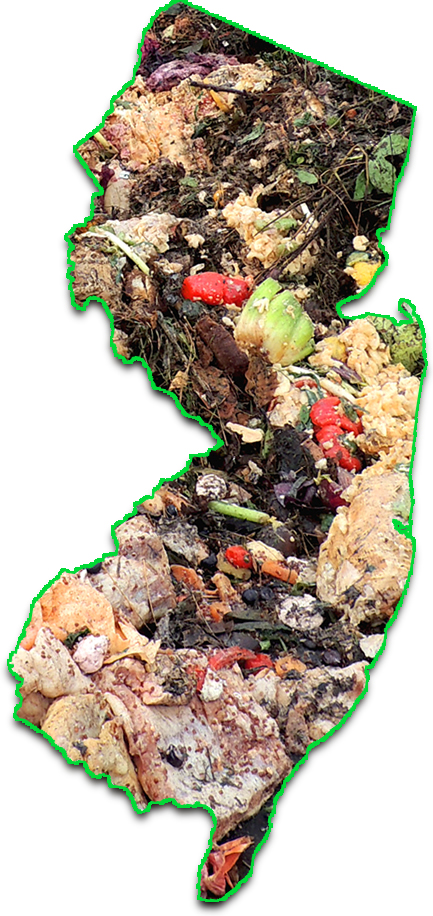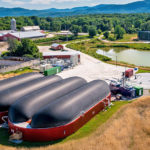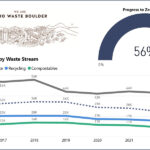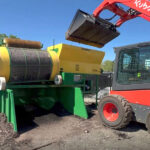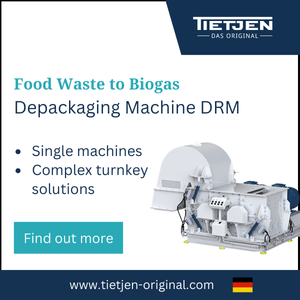
Matthew A. Karmel, Esq.
BioCycle December 2019
The New Jersey Legislature is in the midst of a lame duck session that ends on January 14, 2020. Three pieces of food waste legislation are still pending and could be passed by the Legislature over the next several weeks. The three bills differ in key respects, and are based in part on legislation that has been enacted in other states.
S1206/A3726
S1206 would require recycling of food waste by “large food waste generators” (i.e., certain commercial and institutional entities that produce at least 52 tons/year of preconsumer food waste). To protect businesses from excess costs as a result of this requirement, large food waste generators are required to comply with the mandate only:
• If the large food waste generator is located within 25 miles of an authorized food waste recycling facility with sufficient capacity to accept the waste; and
• If the cost of recycling food waste is less than 10% more than the cost of disposing of the waste through traditional means, provided, however, that the large food waste generator would have to petition the New Jersey Department of Environmental Protection for a waiver from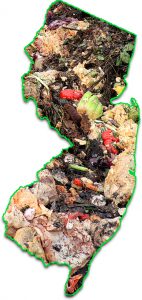 the recycling requirement on this ground.
the recycling requirement on this ground.
The New Jersey legislature passed S1206 in June 2019, but Governor Phil Murphy vetoed the legislation at the urging of a number of industry and environmental groups. The problem? The version of S1206 passed in June contained broad exemptions from the recycling requirement for food waste sent to an incinerator under certain conditions or to a landfill with a landfill gas capture system. The exemptions were championed by several county governments over concerns that the recycling requirement would deprive public landfills of valuable feedstocks and thereby undermine the financial viability of their landfill gas capture systems. In Governor Murphy’s veto, he recommended that the Legislature pass S1206 without the landfill and incinerator exemptions.
S1206 remains pending before the Legislature; the Assembly passed a new version of the bill that incorporates Governor Murphy’s revisions on December 16, 2019, but the Senate has yet to schedule a vote. If the Senate fails to schedule a vote on S1206, the legislation will expire at the end of the current legislative session on January 14, 2020.
S1206 also contains a number of other provisions that have not been the subject of controversy, and which would provide much needed support to the market for products and energy generated by food waste recycling in New Jersey. Specifically, these other provisions would:
• Create a Food Waste Recycling Market Development Council to provide recommendations on how to increase demand for products and energy generated by food waste recycling facilities;
• Require state departments or agencies that engage in landscaping or construction to use compost, mulch or other soil amendments generated from recycling of organic materials where competitively priced and feasible; and
• Provide a financial incentive for energy generated at a food waste recycling facility by giving the facility a “class I renewable energy certificate” which in turn can be sold on an open market or to energy suppliers and can be used by energy suppliers to meet renewable energy portfolio requirements.
S3274/A4876
S3274 would establish statewide targets to reduce disposal of organic waste in landfills. One of the targets is a 50 percent reduction by January 2022 in the level of statewide disposal of organic waste from the 2016 level. The legislation would delegate the responsibility to achieve these targets to the New Jersey Department of Environmental Protection (NJ DEP) and local governments. However, there has been no real movement on this legislation since it was introduced over a year ago. It does not seem likely that S3274 will be advanced further by the Legislature.
S4097/A5893
S4097 — the most recent piece of food waste recycling legislation introduced — is similar to S3274, but uses provisions of the existing New Jersey Solid Waste Management Act (N.J.S.A. 13:1E-1 et seq.) to address food waste. The Act established Solid Waste Management Districts (SWMD), which primarily include each individual county as well as the Hackensack Meadowlands District, and it required these districts, individually or jointly, to develop and implement a comprehensive solid waste management plan. S4097 would require the NJ DEP to publish steps that the Solid Waste Management Districts can take to reduce food waste, and then would require each district to develop and implement a strategy to reduce food waste generated annually in the district by at least 50 percent. Like S3274, local governments would be required to determine how best to address food waste within their jurisdiction.
S4097 is broader than S1206 in that it goes beyond imposing requirements on commercial food waste generators. Under S4097, a SWMD could elect to satisfy the food waste reduction goal by focusing on commercial food waste recycling, residential food waste recycling, donation of edible food that otherwise would become food waste, reducing food waste at the source, and many other possibilities. S1206 also imposes requirements directly on commercial establishments, while S4097 would allow local governments to decide which requirements to impose and on whom. As a result, it is possible for both bills to be enacted without conflict, but this seems unlikely.
Matthew Karmel is an attorney at the law firm of Riker Danzig Scherer Hyland and Perretti LLP, where he practices environmental law; and he also serves on the boards of the NJ Composting Council, an industry group that promotes organics recycling and compost utilization, and Table to Table, a New Jersey-based food rescue organization.


